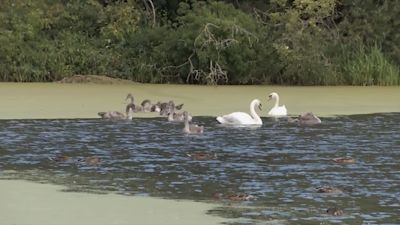Council faces fresh calls to clean up a river in Essex that has turned bright green

Concerns have been raised that a river in Essex that turned bright green is a threat to wildlife.
More than a mile of the River Colne that runs through Colchester is now covered in a thick layer of algae, that some claim is threatening the swans, ducks and fish that call the river home.
Local councillor Simon Crow is calling for a clean-up to clear the weed, which is also making it impossible for canoeists to use the river.
This is not the first time concerns have been raised about the state of the river.
As recently as October 2019, a campaign was led by 11-year-old environmentalist Noah Wilkinson hoping to improve the state of the river. At that time, the council said the weed would disperse naturally.
Councillor Crow said: "Once again no action has been taken about the thick mat of duckweed covering the River Colne where it flows through Castle Park & towards East Street. "Why were we told a maintenance plan had been created yet it's as bad as previous years?"The council say that clearing the river is not on their list of priorities.
Cllr Martin Goss said: "Last year an unprecedented heatwave caused the Colne, to produce an over-abundance of green algae.
"There is currently a short section where algae growth is more extensive than elsewhere and so we have asked the Environment Agency to undertake a health-check, including measuring oxygen levels, to ensure all wildlife is safe.
"The River Colne has no flow in the summer, due to low rainfall, which helps the build-up of algae. When more rain falls in autumn, all algae on the river will naturally decline and disperse as it gets washed downstream to the sea. This is what happened in 2019 and will happen again later this year.
"Currently, due to the Covid pandemic and a huge financial crisis facing local Government, we are having to direct funding to ensure vital frontline services are maintained- and clearing some algae, which will naturally disperse in due course, is not an appropriate use of extremely limited resources."